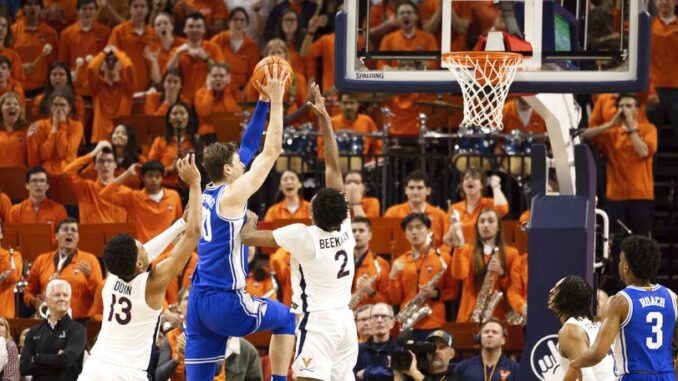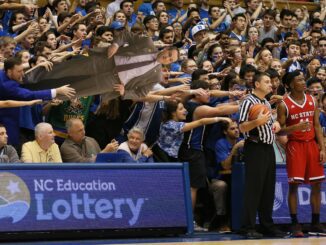
I’m sorry.
Here’s what went wrong.
This is why it won’t happen again.
Those are the three components of an effective apology. In order to tell someone who has been wronged that you’re sorry, you need to sincerely express regret, explain how it could have happened in the first place and give them a concrete reason why you’re never going to do it again in the future.
If any one of them is missing, the apology will not ring true, and the offended party will not have any closure.
When all three are missing, you’ve got the ACC basketball season.
Since the first ball was put into play in the first game, fans have complained about officiating. It doesn’t matter the sport or the level, officials take abuse from both sides. In the old days, it was shouts of “kill the ump” from the stands. Now, griping about bad calls has become a cottage industry, thanks to the ability to pull clips of bad calls and distribute them worldwide on social media. A good official may miss a handful of calls in an average game, but now, those slip-ups will be broadcast to everyone within seconds of the play ending as proof that he or she has it in for the poster’s favorite team.
Even when it isn’t a mistake, a close call can often be interpreted as a bad one, either due to ignorance of rules — such as the NFL’s hard-to-understand catch rule — or wishful thinking by fans. Countless times, arenas will run a replay of a foul called on the home team on the video board, and the crowd will ignore plenty of contact between the two players’ bodies to boo loudly because the actual shot block “looks clean.”
So, it’s easy to dismiss complaints from fans about officiating.
“Why don’t you write about the foul differential?” Because they happen. It’s harder to guard skilled players, and the teams with more of them usually end up with more fouls in their favor.
“They should let them play!” Then there will never be a game-winning shot because the final seconds will devolve into a scrum of clutching and hitting.
“What about the clear bias?” The only bias is in the minds of the people openly rooting for one of the teams.
While fans like to speculate about a vast conspiracy to keep their team from succeeding, the ACC has the opposite problem when it comes to officiating this season. Nothing that the league has shown this basketball season indicates that the officials on the floor are consistent enough to pull off any type of conspiracy. What is and isn’t a foul differs wildly, not just from game to game but from the start to end of a given game. Players will often say they can adjust to the way a game is being called, but once the officials make it clear what’s going to be allowed, they need to stick with it until the final whistle.
Instead, what was a charge in the opening minutes may be called a block after halftime, then allowed to continue with no whistle at all in the final minutes, frustrating fans, coaches and players alike.
And then there are the clear mistakes — the ones that necessitate apologies. Duke has been at the forefront of two of them in recent weeks, not because the league has it in for the Blue Devils but just because that’s how things have turned out.
Women’s coach Kara Lawson complained that officials used a men’s basketball — which has a one-inch larger circumference and is two ounces heavier than a women’s ball — for the first half of Duke’s game against Florida State.
Lawson called it a “complete failure” and “an embarrassment to our sport.” The ACC didn’t even hit the first component of an apology, doubling down and denying that the incident took place. “There was no evidence found to support the claim,” the league said in a statement, although a combined 17-of-64 shooting (.266) by the two teams in the first half, compared to 28 of 69 (.377) in the second half, would seem to be one piece.
Lawson also complained that a mistake like that “would never happen in a men’s game,” but the league promptly proved that statement inaccurate when the Duke men went to Virginia. A back-and-forth game between two of the teams near the top of the league standings came down to the final second, and Duke’s Kyle Filipowski was hit as he tried to lay the ball in at the buzzer.
Officials, who initially called a foul on the play, went to the monitors to review the replay of the incident and concluded that he was hit after the buzzer sounded and overturned the call. The game, tied at the time, meaning any free throws awarded to Filipowski would have won the contest, went to overtime.
“I still would like an explanation exactly what had happened,” coach Jon Scheyer said. “I don’t know exactly what the rule is. I’d like to get some clarification, understand. … I just would like clarity. And hate it for our guys.”
It turned out, the officials didn’t know what the rule was either. The league issued a statement quoting the rule book and admitting that, even if the contact occurred after the buzzer, Filipowski should have been awarded free throws.
The statement from the league “announced an incorrect adjudication of the playing rules.” It concluded with the line, “The conference considers this matter closed and will have no further comment.”
Not sorry. No explanation. No reason to think it won’t be repeated.
When the ACC doesn’t do the right thing for obvious mistakes by its officials, it opens the door to the lunatic fringe. If that call didn’t merit action, then all the other calls will be called into suspicion by fans already leaning in that direction.
I’m sorry. Here’s what went wrong. This is why it won’t happen again.
Until the ACC does something different, it will happen again.



